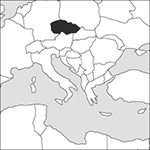
Source: MAPS IN MINUTES™ © RH Publications (1997)
Capital:
Prague
Area:
78,867 sq km (30,451 sq miles)
Population:
10,177,300 (2012 est)
Currency:
1 koruna = 100 haléřů
Religions:
Roman Catholic 10.4%; Protestant 1.1%
Ethnic Groups:
Czech 64.3%; Moravian 5.0%; Slovak 1.4%
Languages:
Czech (official); Slovak
International Organizations:
UN; OSCE; Council of Europe; EU; NATO; OECD; WTO
A landlocked country in central Europe, formerly part of Czechoslovakia.
Physical
The Czech Republic comprises Bohemia and Moravia. It is bordered on the west by Germany, on the south by Austria, on the east by Slovakia, and on the north and east by Silesian Poland. The country lies in the headwater area of the main European watershed; the Labe–Vlatava (Moldau–Elba) river system flows in the Bohemian basin towards the North Sea, and the Odra (Oder) flows northwards towards the Baltic. Rich alluvial soils alongside river courses are characteristic.
Economy
The principal industry is vehicle manufacture, followed by electronics, metals, machinery, glass, and armaments. The main mineral resources are lignite, copper, and zinc, and gold deposits have been found. Wheat, oil seed,potatoes, sugar beet, and hops are grown. Tourism is also important. The Czech Republic has benefited from economic reforms and EU membership, which have transformed a Soviet-era centrally planned economy into a successful market economy.
History
The Czech Republic came into existence on 1 January 1993; it was, until then, part of Czechoslovakia, but an increasingly strong Slovakian independence movement led to plans to separate the two states. The separation process was set in motion in June 1992 and went so smoothly that it was referred to as the ‘velvet divorce’. Václav Havel, formerly President of Czechoslovakia, was elected President of the Czech Republic (1993–2003). Economic progress was slower than expected, despite the implementation of free-market reforms. The Czech Republic joined NATO in 1999 and the European Union in 2004. The eurosceptic former prime minister Václav Klaus became President in 2003 and over the next ten years there were a series of unstable coalition governments. Klaus was followed by another former prime minister, the left of centre Miloš Zeman, in 2013. In 2014 the Social Democrats under Bohuslav Sobotka formed a relatively stable coalition government.
- active pool
- active prominence
- active reconnaissance
- active region
- active remote sensing
- active sensor
- Active Server Pages
- active site
- active star
- active transition((of a clock signal))
- active transport
- active vision
- active volcano
- active voltage
- active volt-amperes
- active widget
- ActiveX
- active zone
- activism
- activist research
- activity
- activity coefficient
- activity network
- activity networks(edges as activities)
- activity networks(vertices as activities)